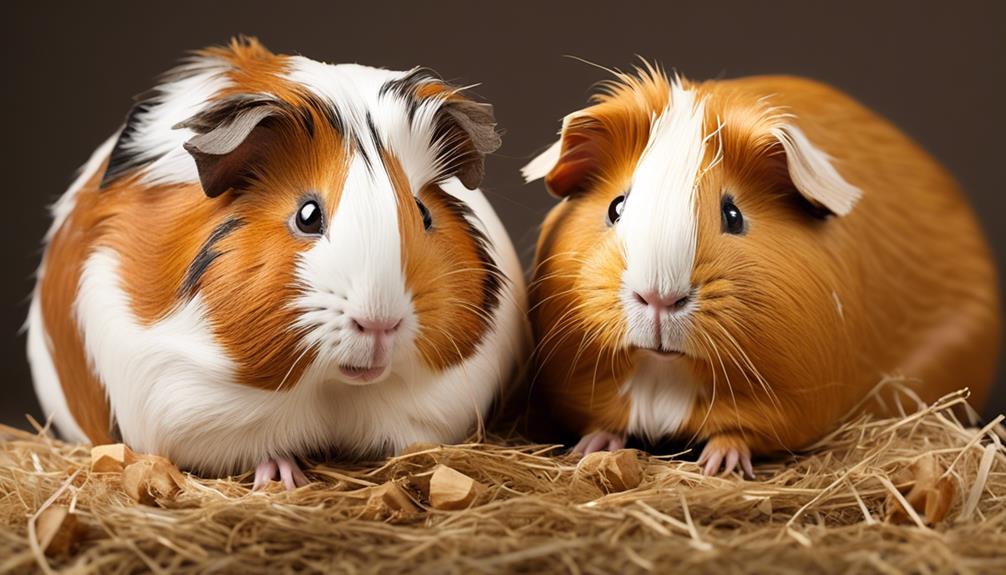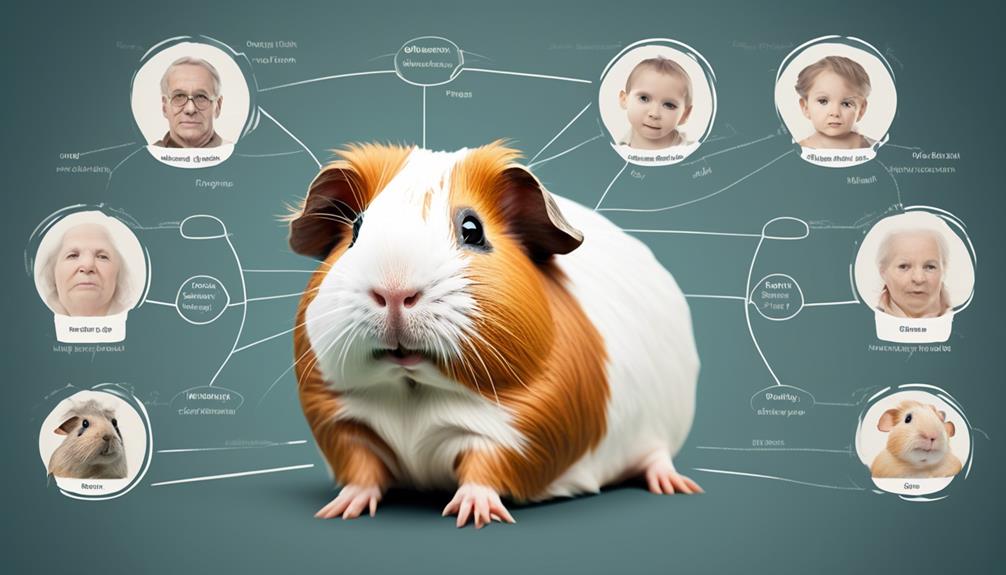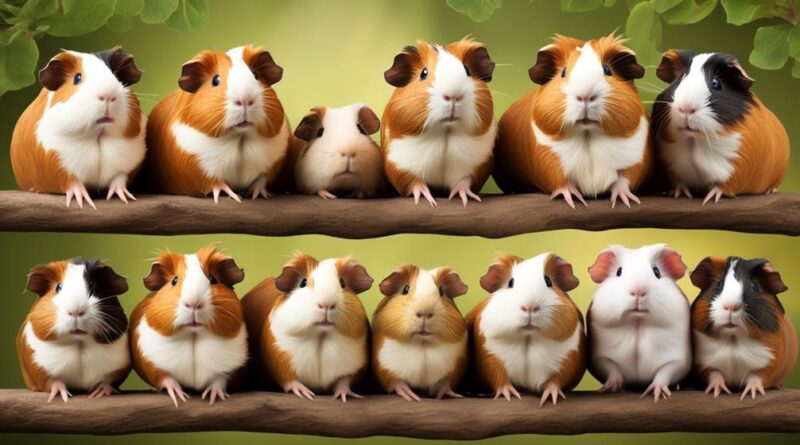Why Does Genetics Impact Guinea Pig Lifespan?
Have you ever considered the impact of genetics on a guinea pig's lifespan?
Like a blueprint for a building, genetics play a crucial role in determining the health and longevity of these adorable pets. Understanding how genetics influence their lifespan can provide valuable insights into their care and well-being.
But what specific genetic factors contribute to the varying lifespans of guinea pigs?
Genetic Factors Affecting Lifespan
Understanding how genetics impacts the lifespan of guinea pigs is essential for responsible breeding and proper care. Lifespan prediction in guinea pigs can be influenced by genetic factors. Genetic testing plays a crucial role in identifying potential health issues and predicting the lifespan of guinea pigs.
Genetic testing enables you to uncover valuable information about your guinea pig's health and potential lifespan. By examining the genetic makeup of a guinea pig, you can identify any predispositions to certain diseases or health conditions that may impact its lifespan. This information can help you make informed decisions about the care and breeding of your guinea pigs.
Through genetic testing, you can gain insights into the potential lifespan of your guinea pigs. By understanding their genetic predispositions, you can proactively address any health concerns and provide the necessary care to support a longer and healthier life. Additionally, genetic testing can assist in identifying any hereditary conditions that may affect the lifespan of guinea pigs, allowing you to take preventative measures and provide appropriate medical care.
Inherited Health Conditions in Guinea Pigs
Inherited health conditions in guinea pigs can significantly impact their lifespan and overall well-being. Genetic diseases are a concern for guinea pig owners, as these conditions can be passed down through inherited traits.
One common inherited health condition in guinea pigs is dental malocclusion, where the teeth don't align properly, leading to overgrowth and potential health issues. This condition can affect their ability to eat and can cause oral sores.
Another genetic disease to be aware of is cystic ovarian disease, which affects female guinea pigs and can lead to reproductive issues and hormone imbalances.
Additionally, inherited respiratory conditions such as pneumonia and chronic upper respiratory infections can significantly impact a guinea pig's health and lifespan.
It's important to be aware of these inherited health conditions and to work with a veterinarian who's knowledgeable about guinea pig care. Regular check-ups can help identify potential genetic diseases early on, allowing for timely intervention and management.
When selecting a guinea pig as a pet, it's crucial to inquire about the health history of the animal's parents to assess the potential risk of inherited conditions. By being proactive and knowledgeable about genetic diseases and inherited traits, you can help ensure the well-being and longevity of your guinea pig.
Impact of Breeding on Lifespan

Breeding practices play a crucial role in determining the lifespan and overall health of guinea pigs, especially considering the potential impact of inherited genetic conditions. When it comes to breeding practices, there are several factors that can significantly influence the lifespan of guinea pigs:
- Selective Breeding: Breeders who carefully select guinea pigs for breeding based on their health and genetic history can contribute to the overall longevity of the species. By avoiding breeding individuals with known genetic health issues, the offspring are less likely to inherit these conditions, thus potentially increasing their lifespan.
- *Longevity Studies*: Longevity studies have shown that guinea pigs bred from healthy parents with longer lifespans tend to live longer as well. This indicates that breeding practices can have a direct impact on the lifespan of guinea pigs.
- Avoiding Overbreeding: Overbreeding can lead to genetic weaknesses and health issues in guinea pigs. Responsible breeders who avoid overbreeding can help maintain the genetic health of the species, potentially leading to longer lifespans for their guinea pigs.
Through careful breeding practices and the consideration of longevity studies, breeders can play a vital role in shaping the lifespan and overall health of guinea pigs. By prioritizing the selection of healthy individuals for breeding and avoiding overbreeding, the genetic predisposition to certain health conditions can be minimized, ultimately contributing to longer and healthier lives for guinea pigs.
Understanding Guinea Pig Genetics
How do guinea pig genetics influence their lifespan and overall health?
Genetic inheritance plays a significant role in determining the lifespan and overall health of guinea pigs. Understanding guinea pig genetics can help in predicting potential health issues and estimating their lifespan more accurately.
Genetic inheritance in guinea pigs involves the passing down of genetic traits from parent guinea pigs to their offspring. This inheritance determines various characteristics, including coat color, fur length, and susceptibility to certain health conditions. By studying the genetic history of guinea pigs, breeders and owners can gain insights into the potential health concerns that may arise and take preventive measures to ensure the well-being of their pets.
Lifespan prediction in guinea pigs can be influenced by their genetic makeup. Certain genetic factors may predispose guinea pigs to specific health issues that could impact their longevity. For example, some genetic mutations can lead to a higher risk of developing conditions such as respiratory problems or dental issues, which can ultimately affect the lifespan of guinea pigs. By understanding the genetic predispositions of individual guinea pigs, it becomes possible to anticipate and address potential health challenges, potentially extending their lifespan.
Genetic Diversity and Longevity
Understanding the genetic diversity of guinea pigs can provide valuable insights into factors influencing their longevity. Genetic diversity refers to the variety of different genetic makeup within a population, and it plays a crucial role in determining lifespan variability among guinea pigs.
When it comes to genetic diversity and longevity in guinea pigs, consider the following:
- Inbreeding and Lifespan: Inbreeding, which occurs when closely related guinea pigs are bred together, can lead to a reduction in genetic diversity. This reduction can result in a higher likelihood of genetic disorders and health issues, ultimately impacting the lifespan of the offspring.
- *Impact on Longevity*: Reduced genetic diversity due to inbreeding may contribute to a shorter lifespan and increased susceptibility to various health problems in guinea pigs.
- Natural Selection and Lifespan: In the wild, genetic diversity allows guinea pigs to adapt to changing environments and resist diseases. This natural selection process favors genetic traits that promote survival and longevity, leading to a more diverse and resilient population.
- *Impact on Longevity*: A wider genetic diversity resulting from natural selection can enhance the overall health and resilience of guinea pigs, potentially contributing to longer lifespans.
Role of Genetic Mutations in Lifespan
With the genetic diversity of guinea pigs impacting their longevity, it's crucial to explore the role of genetic mutations in determining their lifespan. Genetic mutations can significantly affect the lifespan of guinea pigs. Mutations can introduce changes in genes, affecting various biological processes and leading to a range of effects on lifespan. Some mutations may be detrimental, causing health issues that shorten a guinea pig's lifespan, while others might've neutral or even beneficial effects.
Genetic variation plays a pivotal role in determining the longevity of guinea pigs. Mutations can influence the aging process and susceptibility to age-related diseases, thereby impacting lifespan. For instance, mutations in genes related to cellular repair mechanisms or antioxidant pathways can affect how guinea pigs cope with cellular damage and oxidative stress, ultimately influencing their lifespan. Additionally, mutations in genes associated with immune function can impact the ability to fight off infections and diseases, further influencing longevity.
Understanding the specific effects of genetic mutations on lifespan is crucial for developing targeted strategies to promote guinea pig health and longevity. By studying the impact of different mutations on lifespan, researchers can gain insights into the genetic factors that contribute to aging and age-related diseases in guinea pigs. This knowledge can inform breeding practices and veterinary care aimed at maximizing the lifespan and well-being of these beloved pets.
Genetic Predisposition to Diseases

Genetic predisposition to diseases can significantly impact the lifespan and overall health of guinea pigs. This susceptibility to diseases is often inherited and can lead to various health conditions that affect the well-being of guinea pigs throughout their lives.
Guinea pigs, like other animals, can inherit conditions that make them more susceptible to certain diseases. These inherited conditions may include a predisposition to respiratory infections, dental issues, and metabolic disorders.
For example, some guinea pigs may have a genetic predisposition to respiratory infections, such as pneumonia or bronchitis. This susceptibility can lead to recurrent respiratory problems, impacting their overall health and longevity.
Additionally, certain guinea pig breeds may inherit dental issues, such as malocclusion, which can lead to dental problems and difficulties in eating. These inherited dental conditions can significantly impact their quality of life and lifespan.
Understanding the genetic predisposition to diseases in guinea pigs is crucial for their proper care and management. By identifying these inherited conditions, guinea pig owners and breeders can take proactive measures to minimize the impact of these diseases on the animals' health. This may include specialized care, regular veterinary check-ups, and selective breeding practices to reduce the prevalence of these inherited conditions within guinea pig populations.
Ultimately, recognizing and addressing disease susceptibility due to genetic predisposition is essential for promoting the overall health and longevity of guinea pigs.
Genetics and Lifespan Variability
The impact of genetics on guinea pig lifespan extends to the variability in their longevity and overall health. Lifespan variability in guinea pigs is strongly influenced by genetic factors. Genetics play a crucial role in determining the potential lifespan of a guinea pig and the range of health issues they may encounter throughout their lives.
Genetic influences contribute to the variability in guinea pig lifespan. Different genetic factors can affect how long a guinea pig lives and the quality of life they experience. Some genetics may predispose guinea pigs to certain health conditions or diseases that can impact their longevity. Conversely, other genetic factors may contribute to overall resilience and well-being, potentially extending their lifespan.
Genetics also play a significant role in determining various longevity factors in guinea pigs. Factors such as metabolic rate, susceptibility to specific diseases, and overall cellular health are all influenced by genetics. Certain genetic variations can affect how efficiently a guinea pig's body functions, impacting its ability to maintain good health and potentially influencing its lifespan.
Understanding the genetic influences on lifespan variability in guinea pigs can aid in developing strategies for promoting their health and longevity. By considering the genetic factors at play, breeders and pet owners can make informed decisions to support the well-being and extend the lifespan of their guinea pigs.
Frequently Asked Questions
Can Guinea Pig Lifespan Be Extended Through Genetic Modification or Selective Breeding?
You can potentially extend a guinea pig's lifespan through genetic modification or selective breeding.
Through genetic modification, specific traits affecting longevity can be enhanced.
Selective breeding allows for the mating of guinea pigs with desirable traits, potentially leading to longer lifespans.
Longevity testing and identifying health predispositions can aid in selecting the best candidates for breeding.
These methods hold promise for positively impacting guinea pig lifespan through genetic factors.
Are There Specific Genes That Have Been Identified as Directly Influencing Guinea Pig Lifespan?
Genetic mutations can lead to lifespan variations in guinea pigs. Researchers have identified specific genes that directly influence guinea pig lifespan. These genes have been found to play a crucial role in determining the longevity of guinea pigs.
Understanding the impact of these genetic factors can provide valuable insights into potential strategies for extending the lifespan of these beloved pets through targeted breeding and genetic interventions.
How Do Environmental Factors Interact With Genetics to Impact Guinea Pig Lifespan?
Environmental influences and longevity genes play a crucial role in impacting guinea pig lifespan. Factors like diet, living conditions, and exposure to stress can interact with genetic predispositions, affecting how long your guinea pig lives.
Is There a Way to Test for Genetic Predisposition to Certain Health Conditions in Guinea Pigs?
Yes, genetic testing can identify predispositions to health conditions in guinea pigs. This can help in understanding and addressing potential health issues, contributing to lifespan extension.
Selective breeding based on genetic testing results can also aid in producing guinea pigs less susceptible to certain health conditions, potentially improving overall health and longevity.
Are There Any Ongoing Research Studies Exploring the Relationship Between Genetics and Guinea Pig Lifespan?
There are ongoing research studies exploring genetic markers and lifespan variability in guinea pigs. Genetic diversity plays a significant role in the longevity of these animals.
Researchers are investigating how specific genetic traits impact the overall lifespan of guinea pigs. Understanding these genetic factors can provide valuable insights into improving the health and longevity of guinea pigs.
Such studies are essential for developing targeted interventions to support the well-being of these pets.
Conclusion
So, genetics really do have a big impact on the lifespan of guinea pigs.
Inherited health conditions, breeding practices, genetic diversity, mutations, and predisposition to diseases all play a role in how long a guinea pig will live.
Understanding these genetic factors can help guinea pig owners provide the best care and support for their pets, potentially extending their lifespan and improving their overall well-being.
